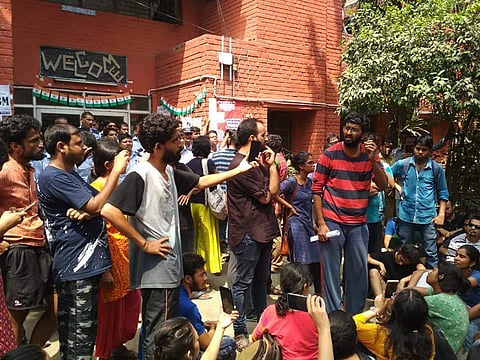

In an apparent attempt to wield greater control over private universities existing in Uttar Pradesh, the state government is set to table a new ordinance which makes it mandatory for the new and existing private universities to give an undertaking that they will neither let their campus nor their name be used for any anti-national activity.
The draft "Uttar Pradesh Private Universities Ordinance, 2019", which would bring 27 private universities, operational in the state, under the purview of the proposed law, accords one year time to existing universities to adopt all provisions of it. It further says that any such Rashtra Virodhi Gathividhi (anti-national act) would be construed as a violation of the rules of the establishment and the government would be liable to take action against the errant institution.
The draft of Uttar Pradesh Private University Ordinance, 2019, to be presented in the upcoming session of the state legislature from July 18, was approved by the state cabinet on Tuesday. However, the draft ordinance does not clarify what would amount to anti-social activity.
The 'anti-national' activity clause in the proposed ordinance seems to have found its genesis in incidents which have taken place on various university campuses from time-to-time like Jawaharlal Nehru University. For instance, some social media posts suggested last year that a Kashmiri student Ahtesham Bilal Sofi, pursuing graduation from Sharda University, joined militancy after he went missing from campus in October 2018. The picture on social media showed Sofi attired in black and claiming that he had joined ISJK, an outfit influenced by Islamic State ideology. UP ATS was tracking Sofi in follow up of the social media posts and the missing FIR registered at Knowledge Park police station in Greater Noida.
Similarly, this year, post-Pulwama airstrikes, three Kashmiri girl students of Indian Veterinary Research Institute in Bareilly were booked for allegedly forwarding controversial comments along with their own remarks against Indian Army on an instant messaging app.
Defining the objectives for universities, a statement by the UP government claims that universities will have to ensure that patriotism, national integration, communal amity, social harmony, secularism, ethics and international goodwill are included in the curriculum. Calling the proposed ordinance as a significant step towards improving the academic ambience of the institutions of higher education in the state, UP Cabinet minister and state government spokesman Sidharth Nath Singh said that Uttar Pradesh Private Universities Ordinance 2019 would serve as an umbrella act for state's 27 private universities, which had been running under separate acts all this long.
The draft of the proposed ordinance does not even specify 27 universities to be brought under the ambit of the new law. However, as per the data released by UGC, 29 private universities had been functional in UP till November 2018. To name a few -- Amity University, Bennet University, Babu Banarasi Das University, Galgotias University, Sharda University, Shiv Nadar University, Manglayatan University and Mohammad Ali Jauhar University in Rampur -conform to the category of private universities. Singh also said that once notified, the Ordinance will serve as a controlling and monitoring body to regulate fee structure, call sessions, appointment teachers and follow UGC guidelines. He said that best practices adopted in international universities have also been included in the proposed law.
The other provisions of the proposed ordinance pertain to university land which the owner would not be able to sell, transfer or lease though it can be mortgaged to a bank or financial institution for establishment of the university. Moreover, private universities will not be allowed to bestow an honorary degree upon anyone without prior approval of the state government.
It has also proposed that a minimum of 75% of teaching staff would have to be regular appointments. A common academic calendar will be specified under which there will be common dates for conducting exams and declaration of results. Provision has also been made in the ordinance to ensure that fee structure is placed in the public domain and the appointment of vice-chancellor would be done by the chancellor only after consultation with the governing body.
The Cabinet also approved an endowment fund of Rs 5 crore, which can be used by students to complete degrees if the university they study in stops to function in the middle of the session. Singh said that apart from setting up the endowment fund, the state will take over the university's property if its administration stops to function or abandons its functions.
Besides, UP State Higher Education Council being entrusted to oversee compliance with the ordinance and rules as nodal agency, the draft empowers the state government to revoke recognition of a university if charges of cheating, corruption or misuse of funds against it are proven. The council can order an investigation into such charges. After the university is given a chance to defend itself, the government will be authorised to dissolve the university through a notification.
This 26-year-old from Kolkata was criticised for being skinny. Here's how Yoga changed her life
Video of students of Kathua school crying goes viral, authorities provide psychological counselling
This Yoga master from Bengaluru trains kids and adults with special needs
School Education Secretary advises students to teach yoga to their parents
